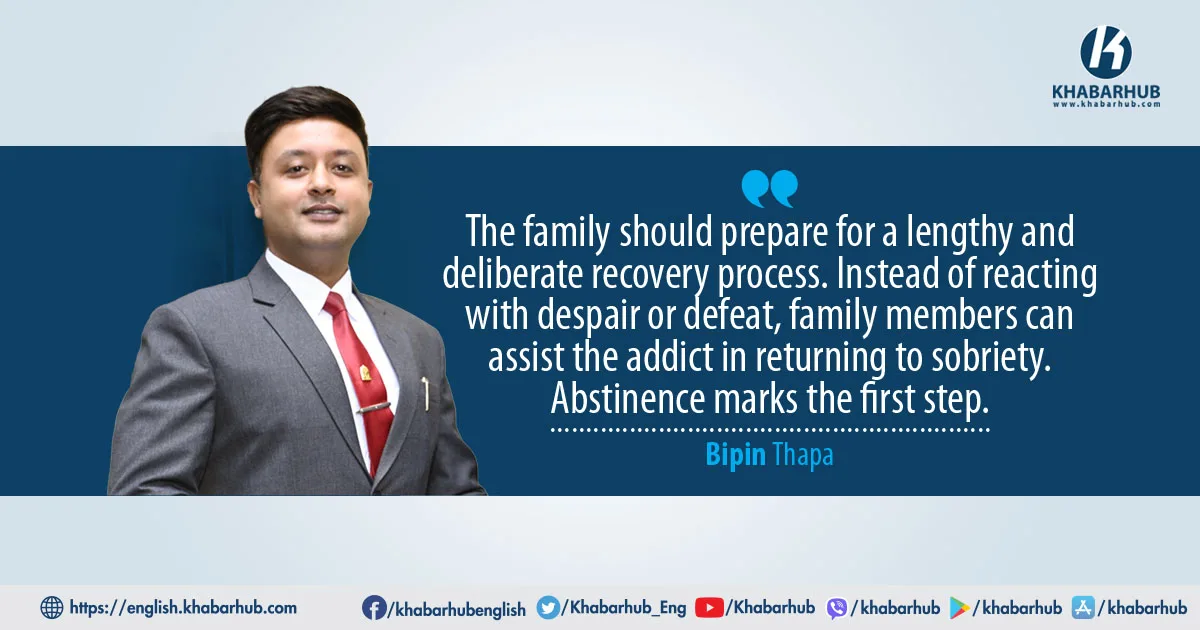Chemical dependency is not an isolated issue that affects only one individual. In every case, there are multiple victims. Apart from the chemically dependent person, the primary victims are their spouse, parents, and children.
While each family appears unique, they share certain common traits and characteristics. All families tend to react in patterned and predictable ways when one member becomes a victim of chemical dependency.
The functioning of the family is directly related to and influenced by the illness of the chemically dependent individual.
Family members operate within a system, wherein they are interdependent and collaborate for survival and well-being. When stress arises, the entire family readjusts and realigns to restore balance and stability.
The family of the chemically dependent person comprises hurt and confused individuals. They are victims of addiction who do not use chemicals but are nevertheless affected by them. These individuals are victimized by the drug and struggle desperately to solve their problems.
“The chemically dependent partner numbs his feelings, and the non-abuser is doubled over in pain, relieved only by anger and occasional fantasies,” wrote Janet Geringer Woititz.
For family members, grief results from various losses: loss of prestige, family and personal dignity, feelings of love, care, understanding, security, friendships, finances — loss in every area of their lives. The most tragic aspect is that they suffer alone, unable to share their feelings of grief with anyone.
The family members of the chemically dependent person suffer in the shadow of the sick individual.
They are rarely treated as individuals in need of help and are seldom provided with personalized recovery programs for their problems and pain. The unfortunate truth is that they also desperately need proper help, support, and understanding.
These individuals, who do not drink or take drugs but are victimized by chemical abuse, are known as codependents. Codependency is a normal reaction to the abnormal behavior of those around them.
Chemical dependency refers to being physically and psychologically dependent on alcohol or other drugs.
Codependency refers to being a partner in dependency. It is an emotional, psychological, and behavioral condition that develops due to prolonged exposure to and practice of a set of oppressive rules – rules that hinder the open expression of feelings and direct discussion of personal and interpersonal problems (Robert Subby).
“Codependency” is the term used to describe a person whose life is affected as a result of their involvement with the chemically dependent individual.
This codependent typically develops unhealthy coping patterns with life. Even though they desire for the addict to completely quit drugs, they unconsciously adopt defective and destructive roles that reinforce the chemical dependency.
Codependents are individuals who constantly react. They react to the problems, pains, and behaviors of others, as well as to their own problems and pains. They need guidance to learn to act rather than react, requiring substantial assistance to develop this skill.
As problems accumulate, codependency leads to isolation, depression, emotional and physical illness, and suicidal attempts.
Like any other repetitive behavior, it becomes habitual. Codependents continue these habits without thought, and they take on a life of their own.
Let us now analyze the various responses and behavioral patterns of codependents.
Emotional Responses
When a chemically dependent person encounters trouble and develops problems due to substance abuse, their family becomes deeply concerned and upset.
Guilt
The emotional response to addiction in a family member often stems from feelings of guilt. Our culture often implies that if a person drinks excessively or abuses drugs, someone else must be to blame. Typically, society places blame on the spouse or parents.
For instance: “Ram’s wife comes from a wealthy family. She’s arrogant and always tries to control him. She doesn’t care about him at all. It’s no surprise Ram drinks so much.” “I’ve never seen parents like them. They’re overly permissive. They never cared for their son. They sent him to a hostel. Poor boy! That’s why he’s using drugs!”
Society’s attitudes automatically lead to self-blame: “Am I responsible for his drinking?” “Am I inadequate?” “Does he deserve a better wife?”
Such self-blame intensifies guilt and shame. This level of guilt is unsustainable. Eventually, each member of the family begins blaming the other, preventing self-awareness and positive change. The chemically dependent person remains trapped in dependency, while the spouse remains caught in repetitive patterns of behavior and attitude.
Grief
Grief is another emotional response of the family to addiction. The family experiences the loss of life’s pleasures, not confirmed by death and its consequent mourning and healing, but rather an ongoing, chronic period of loss and anxiety with no clear end in sight.
As the harmful dependency progresses, the addict’s inappropriate behavior becomes increasingly difficult to conceal. Family members feel humiliated at every turn, ashamed of the addict’s behavior, and helpless to change it.
The mere physical presence of the chemically dependent individual neither helps nor supports; it only exacerbates problems.
For family members, grief results from various losses: loss of prestige, family and personal dignity, feelings of love, care, understanding, security, friendships, finances — loss in every area of their lives. The most tragic aspect is that they suffer alone, unable to share their feelings of grief with anyone.
Just like any bereaved person, they need someone to listen to them as they express their grief; someone to understand that they are also victims of the disease; someone to help them shift their focus from the dependent person to themselves. This is the only way to overcome grief.
Anger
When their voices aren’t heard, family members experience anger and profound sadness. Initially, this anger is directed at the addict and their inappropriate behavior.
For example: “Everyone is laughing at us. We can’t even go out because of you. Aren’t you ashamed? I wish you were dead!”
As the disease progresses, the spouse or parents become unable to manage the mounting problems. Their sheer helplessness intensifies their anger. Now their anger has no specific target; it’s directed at themselves, their spouse (even when sober), their children, friends, and society at large.
Although family members may be extremely angry, they rarely express it openly. Hostility simmers beneath the surface, waiting for an outlet. Occasionally, anger explodes, but it achieves nothing positive.
The addict shouts throughout the night, and the next morning, the spouse shouts back. Neither listens. The crucial point is that the spouse no longer feels guilty for shouting. As they both engage in shouting matches, their anger seems to even out.
However, problems remain unresolved, and anger persists. Their misplaced anger may extend to their children. Suppressing anger leads to physical problems like migraines, digestive disorders, etc.
With family members, anger often arises from a mental conflict. They care for the dependent person but detest the painful experiences they are forced to endure. They become caretakers solely to maintain their dignity and save face.
This caretaking attitude lacks any deep feelings of love. The painful experiences lead to anger towards the addict, and separating the dependency from the person is not easy.
They adopt protective, defensive behavioral patterns and, despite talking extensively, fail to communicate purposefully or share their feelings with each other or those around them, leaving them deeply isolated.
For example, the wife may feed the alcoholic when he returns home completely drunk (caretaking), but she may also harbor thoughts of wishing he would die so that her life could be peaceful (resentment).
Hurt
If anger is suppressed, it can result in frustration, resentment, and hurt feelings. Emotional pain can be profound and destructive.
As the harmful dependency progresses, the addict’s inappropriate behavior becomes increasingly difficult to conceal. Family members feel humiliated at every turn, ashamed of the addict’s behavior, and helpless to change it.
It’s painful to be drawn into unnecessary arguments or witness angry exchanges, especially when the addict blames them for his shortcomings.
For instance, if the addict tells his spouse, “I don’t need you at all! You can leave this house,” her immediate reaction may be, “I’m not staying for your sake. I’m enduring this because of my duty to our family and children. If I were as irresponsible as you, I would have left long ago.”
Even though she may shout, she is deeply hurt. This kind of emotional pain compounds feelings of guilt and shame. Sometimes, she may try to change her approach and show care and warmth, but her efforts may yield no positive results, with the addict continuing his abuse and the problems persisting unchanged.
Shame
Many painful experiences resulting from chemical dependency bring shame to family members. The addict’s inappropriate behavior in front of relatives and friends embarrasses the family.
As the family’s situation worsens, shame multiplies, and individuals begin feeling ashamed of themselves, the addict, and all other family members.
Shame diminishes the self-worth of every family member. For example, a mother of an addict may avoid social gatherings for fear of being asked about her son’s addiction, which fills her with shame and resentment.
Fear
Living in a troubled family environment breeds fear of the future, family life, financial matters, relationships, arguments, the dependent’s physical well-being, drunkenness, and a persistent fear that things will never improve.
Individuals may deeply fear minor events, such as a child arriving home late from school, yet fail to take positive action to alleviate their fears. These feelings of fear stem from the emotional stress internalized by each family member.
Loneliness
The stressful environment in a chemically dependent family disrupts normal family communication. Love, care, and concern are overshadowed by stress, anxiety, and crisis, leading to isolation and profound loneliness.
Issues such as lack of communication, unsatisfactory sexual relationships, financial mismanagement, or difficulties in maintaining discipline can no longer be solely attributed to the stress caused by addiction or the addict themselves.
To shield themselves from further emotional pain, family members often conceal their emotions and avoid disclosing them to outsiders.
They adopt protective, defensive behavioral patterns and, despite talking extensively, fail to communicate purposefully or share their feelings with each other or those around them, leaving them deeply isolated.
Problems Experienced by Family Members During Recovery
As chemical dependency evolves into a family disease, virtually all members of the family require some form of assistance to recover.
If chemical dependency has persisted within the family for an extended period, it’s highly probable that all family members will need outside help to restore themselves to a state of health and happiness.
As previously mentioned, in their efforts to shield themselves from the pain of the disease, they may have developed their own emotionally inadequate coping mechanisms, resulting in a loss of control.
If one family member endeavors to make fundamental changes, it automatically triggers a tendency in other members to also undergo significant change.
Addiction is a disease that has taken years to develop and thus cannot be resolved overnight, even with treatment.
The family should prepare for a lengthy and deliberate recovery process. Instead of reacting with despair or defeat, family members can assist the addict in returning to sobriety. Abstinence marks the first step.
Throughout the subsequent recovery, family members must adapt to each other on a new basis, during which new problems may arise.
Roles and responsibilities traditionally shouldered by the wife, for example, may have provided some satisfaction, but some of these roles may need to be relinquished.
Some problems experienced during chemical dependency may persist during the recovery period as well.
Issues such as lack of communication, unsatisfactory sexual relationships, financial mismanagement, or difficulties in maintaining discipline can no longer be solely attributed to the stress caused by addiction or the addict themselves.
Rather, each family member should begin “owning up” to and accepting responsibility for some of the household problems. While adjustment may initially be challenging, it is indeed possible.









Comment